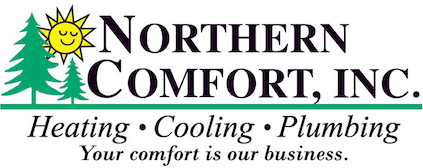
If you’re unsure whether your Mankato area home has unhealthy indoor air quality (IAQ), it likely does.
We are indoors a lot. In reality, we’re indoors up to 90% of the time, according to the U.S. Environmental Protection Agency. And the air inside residences could be 2–5 times more contaminated than outdoors, which may create long-term health issues.
Most Common Sources of Bad IAQ
We’ve made a list of the most common causes of bad IAQ, the problems they make and how you can remedy these indoor air pollutants. If you’re troubled by the air inside your house, we recommend talking with a pro like Northern Comfort Inc about which options are best for your house.
Volatile Organic Compounds
Volatile organic compounds, or VOCs, are fumes emitted from common household things.
They’re found in paint and stains in addition to:
- Furniture
- Carpet
- Building materials
- Cleaning products
- Cosmetics
- Air fresheners
- Candles
When these chemicals accumulate in your home, they may irritate your eyes, nose and throat. They can also result in headaches and nausea. Regardless of whether your home is in a rural or industrial space, an EPA study found indoor levels of these fumes can be 2–5 times higher than the air outside.
Always use the manufacturer’s guidelines when using paint or cleaning supplies. Opening a window can help chemicals disperse faster.
Air purification systems can also improve your air. This equipment partners with your heating and cooling system to enhance indoor air. When seeking one, ensure it’s specifically designed to eliminate VOCs.
Dust and Pet Dander
Dust and pet dander can trigger health problems like asthma and allergies, especially when it constantly gets redistributed by your house’s comfort system. While you can vacuum more regularly and buy an improved air filter, an air filtration system might be a better solution.
This solution hooks to your heating and cooling equipment to provide strong filtration. Some kinds offer hospital-level filtration for eliminating particles and bioaerosols.
Lingering Odors
Modern residences are tightly sealed to enhance energy efficiency. While this is fantastic for your utility bill, it’s not ideal for your IAQ.
Musty odors can stick around for a greater amount of time since your residence is pulling in reduced fresh air. As keeping your windows open all year-round isn’t an option, here are two methods you can make your indoor air smell fresher.
An air purification system is installed in your ducts to neutralize odors before they are redistributed. Find one with a carbon filter and the ability to break down damaging VOCs. These systems can also help keep your household healthy by wiping out most bacteria and ordinary allergy triggers like pollen and mold spores.
A ventilation system pulls out stuffy indoor air and exchanges it with fresh outdoor air. There are two models of systems (heat recovery and energy recovery), so call our professionals for more details on which kind is ideal for your house.
Unsteady Humidity
It’s critical your home’s humidity remains even. Air that has too much moisture can lead to mold, while dry air can lead to respiratory issues.
Our professionals suggest 40–50% for the best comfort. To keep yours in balance, consider getting a whole-home humidifier or whole-home dehumidifier with your HVAC unit.
Instead of having to pull a humidifier from room to room, this equipment delivers consistent humidity throughout your house.
Carbon Monoxide
Carbon monoxide is colorless gas you can’t smell. It occurs when there’s insufficient combustion in fuel-burning equipment, like gas heating systems, water heaters or fireplaces.
It creates a serious health risk. In low levels, it can create flu-like ailments like headaches and nausea. It could be lethal in large levels.
We recommend yearly furnace maintenance to ensure your equipment is running smoothly. This job allows our professionals to discover issues before they get bigger, including malfunctions that can create carbon monoxide leaks.
The best way to keep your house free of carbon monoxide is to put in detectors. These alarms must be on all floors by bedrooms and living rooms.
Enhance Your House’s Air Quality with the Northern Comfort Inc Experts
Know that your house has poor air quality but not sure how to make it better? Or unsure which option is ideal for you? Give our kind HVAC experts a call at 507-387-6596 or contact us online today. With free estimates and professional support, we’ll help you choose the right option for your family and budget.


